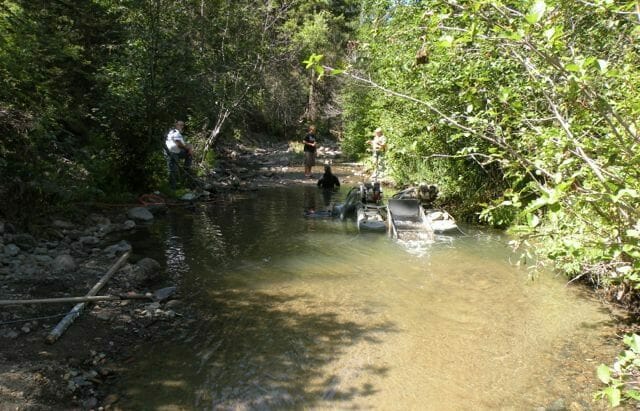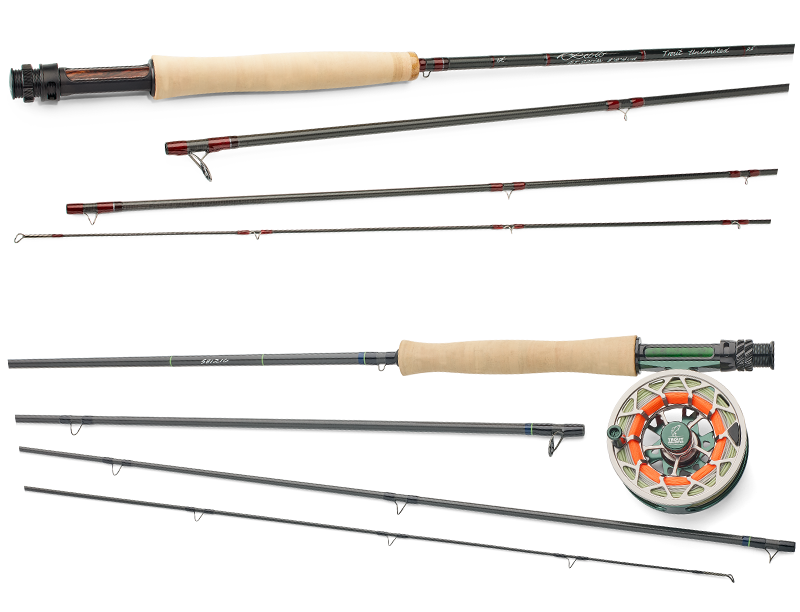
TU is working hard to address a serious problem impacting Washington’s watersheds and threatening the health of our native fish populations: unregulated suction dredge mining and other forms of motorized mineral prospecting.
Most recently, TU helped to introduce HB 1261and SB 6149 which would bring Washington in compliance with Clean Water Act rules and would ban suction dredge mining in Endangered Species Act-designated Critical Habitat for listed salmonids. Right now, you can help pass this bill and protect Washington’s waters!
What is motorized suction dredge mining?
A form of mining that uses gas-powered dredges to vacuum-up rocks, gravel, and sediment from the bottom of creeks and rivers to search for gold.
What are the impacts?
Scientific studies show suction dredging degrades water quality through erosion and sedimentation and mobilization of mercury and other heavy metals; impacts fish and the aquatic food web by destroying aquatic habitat, physically “processing” fish and aquatic life, creating fish stranding risks, and denuding riparian vegetation. In filing a brief with the federal 9th Circuit in support of Oregon and California laws regulating motorized mining, Washington State’s Attorney General Bob Ferguson wrote the following:
“In fact, Oregon’s statute reflects a scientific consensus about the serious environmental risks posed by suction dredge mining and need for adequate regulation . . . Suction dredge mining can harm fish, including endangered salmonids, by disrupting spawning, creating unstable tailings, and killing eggs and larvae . . .”

Where is it happening?
Motorized suction dredge mining is harming water quality and fish habitat in Washington’s rivers and creeks across the state, including areas like the Yakima Basin, Upper Columbia, Lewis River, Spokane River, and Puget Sound rivers such as the Skykomish, Skagit, and Nooksack. In some areas, suction dredge mining is allowed in rivers and streams closed to all other recreational activities, such as Nason Creek.
Impacted areas include ESA-designated Critical Habitat for Chinook salmon, which are the primary food source for our endangered population of Southern Resident Killer Whales (orcas). Protecting the water quality and habitat from motorized mining benefits salmon and helps increase the prey base for our orca population, as well as supporting economically vital sport, commercial, and tribal fisheries.
Why does Washington State need legislation now?
Federal courts have recently ruled that discharges from motorized mining must comply with the federal Clean Water Act. Oregon, California, and Idaho have all enacted programs to comply with the Clean Water Act and protect Endangered Species Act (ESA)-listed fish species, but Washington State has not. Washington is the only state with populations of Endangered Species Act (ESA)-listed Pacific salmon and steelhead that still allows suction dredge mining and other forms of motorized mineral prospecting without requiring permits or regulatory oversight. Consequently, Washington State has become a target for out-of-state miners, creating much greater pressure on our streams and a dangerous situation for our water quality and native fish.
Safeguard our investment in salmon recovery!
The hundreds of millions of dollars spent by tribes, landowners, local and state governments (taxpayers), and non-profits to protect and restore Washington rivers and streams are at risk of being squandered without improved regulation of motorized mining.
HB 1261 and SB 6149 will protect areas most important to ESA-listed salmon, steelhead, and other native fish by prohibiting motorized mining in Critical Habitat. Non-mechanized forms of recreational mineral prospecting, such as gold panning, will still be allowed in all existing areas and will be unaffected by this legislation. Aquatic motorized mining operations in other areas must comply with state water quality laws and the Clean Water Act.
Helpful Links & Articles
- Factsheet for distribution
- Opinion article published by The Seattle Times
- Gold Vs. Salmon” film
- The science is clear on suction dredge mining
Want to stay in the loop? Sign up here for more information.

